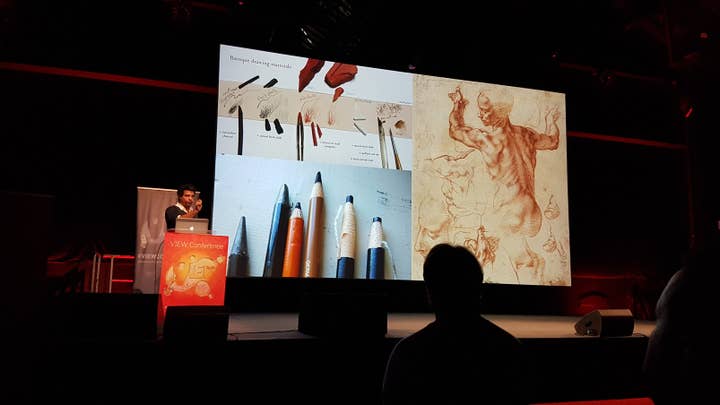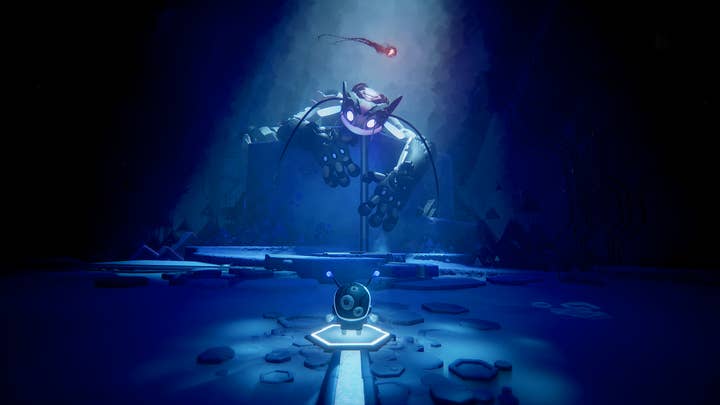Media Molecule wants Dreams games published "to other devices and beyond"
At the View Conference, Kareem Ettouney discussed the need for Dreams to be a creative platform outside the confines of PlayStation
Media Molecule's plans for Dreams extend to giving users full commercial ownership of their creations, and allowing them to publish their games on other platforms.
Dreams is a PlayStation 4 exclusive from a studio that is owned by Sony Interactive Entertainment. The same was true of another Media Molecule IP, LittleBigPlanet, which was also a platform for user-generated content. However, anything made with LBP's tools were closely tied to the game and the console.
GamesIndustry.biz spoke to Kareem Ettouney, the studio's co-founder and art director, at the View Conference in Turin, Italy. In a Q&A session after a talk on the power of Dreams' toolset, Ettouney articulated that Media Molecule wanted its players to be able to publish any games or art they make outside of the platform and the Sony ecosystem.
"The answer is yes," he said. "We want people to be able to go to the moon with their projects. We already have a commercial license, which means when you get Dreams you can apply to get the commercial license... And then everything you make in Dreams is yours to use commercially outside of Dreams.
[UPDATE]: After the publication of this article, a Media Molecule representative reached out to say Ettouney misspoke, that there is no commercial license available for Dreams at the moment, but it is something the studio is looking into.[/UPDATE]
"We have in the long-term [plans for] exporting a standalone game outside of Dreams entirely"
"The very limited exporting features the moment are like exporting a video, but we have in the long-term [plans for] exporting a standalone game outside of Dreams entirely -- exporting to other devices and beyond.
"But step one is to show our intent -- so that from the very beginning we are doing this commercial concept, which means that everything you do in Dreams is yours. You can use it. People in the Dreams community have already been using it to make graphic design, album covers and stuff like that. Using it for their portfolios and showreels.
Ettouney added: "Totally, the answer is yes. We have plans, features and dreams [of our own], and we hope to make it go to the 11th degree, so that people can celebrate their creations completely."
At the start of his talk at the View Conference, which focuses on 3D art and animation communities across all entertainment and culture, Ettouney said that the guiding ambition behind Dreams was to make "the YouTube of games, that never-ending stream of media."
"Where every time you fire it up you get new material being made for you," Ettouney continued. "Where it understands what you like and shows you what you like, just as you're used to now."
LittleBigPlanet's tools were impressive, allowing users to make a broad range of experiences -- broad enough, Ettouney said after his talk, that actual careers were built upon what players created in the game.
"Most of our design department are people from the LittleBigPlanet community," he said. "They get jobs at Media Molecule and beyond Media Molecule."
With Dreams, though, Media Molecule had to go "fully deep" on the creation tools for it to be relevant in the modern world. Powerful tools are now abundant and easily accessible, Ettouney said, and often free. The direction the studio ultimately took was in part influenced by the question: "Why make another user generated content platform at all?"
"But step one is to show our intent -- so that from the very beginning we are doing this commercial concept"
"I felt it was a fairly big mountain to climb," he added. "But then we started looking at the tools."
Ettouney showed a slide composed of user interfaces from popular engines and 3D art packages; a morass of buttons and sliders and scales and widgets, virtually impenetrable to the untrained eye. With a skilled guide, he said, these tools can be made to seem straight forward, but they all suffer from "cockpit syndrome."
"Everything does something, but nothing about it is alluring in the same way as a clarinet or a guitar. Six strings and a piece of wood, and yet [different musicians] can do very different things with it. The mystique is more in the person than the tool.
"Most of our tools are designed as an evolution of engineering software. They all started in the early '80s when the processors weren't that powerful... They're very numerical. Put in a number, change the number, look at the result, put in another number -- and do that a million times."

The intention with Dreams was to develop a more intuitive system, more akin to what Ettouney believes are the two greatest tools ever invented: the pencil and the piano. In both cases, he said, someone can use them for the first time and immediately educate themselves. With a pencil, a soft or firm grip will result in a different kind of line. With a piano, a light or heavy touch will result in different sounds -- as illustrated in a charming video of Ettouney's infant daughter doing exactly that in her first encounter with the piano in his home.
""Our goal for Dreams is to last for 20 years, and keep expanding it and keep adding to it and keep improving it"
Ettouney described the pencil and the piano as "sensitive tools." Media Molecule was able to get closer to that ideal in Dreams thanks to the motion-sensing technology in the DualShock 4, and particularly the one-to-one hand-tracking offered by the PlayStation Move controllers. He demonstrated the power of the system in a short video, in which an elaborate landscape of rock, foliage, water and architecture was sculpted in a matter of minutes -- much to the delight of View's attendees.
What is possible with Dreams' "sensitive tools" has clear implications for its users, specifically around ownership of the sophisticated games and art in which they have invested so much time and skill. Locked to the PlayStation 4, everything created in Dreams will arguably create the most value for Sony, which isn't the case with the commercial tools Media Molecule invokes when discussing its platform. Allowing creators to publish their games elsewhere is a logical step, just as it was logical for YouTube to let its users monetise their video content.
The last question put to Ettouney was also about the nature of Dreams as a PlayStation exclusive. Would Media Molecule and Sony ever make it available on PC or Mac, the platforms where so many creatives do their professional work?
"The answer to every question is 'yes', but Dreams needs to reach a lot of people first," Ettouney said, with obvious hesitation. "Our goal for Dreams is to last for 20 years, and keep expanding it and keep adding to it and keep improving it.
"But most of the PlayStation model is designed for a game to come out, it hits the market, and it makes most of its returns in the first week, y'know? If it's a big game, it survives for maybe two or three sequels.
"We need to reach [an audience] and then grow. But it's definitely in our dreams to do Pro versions that are expanded. It just depends on a lot of things working out for us."

